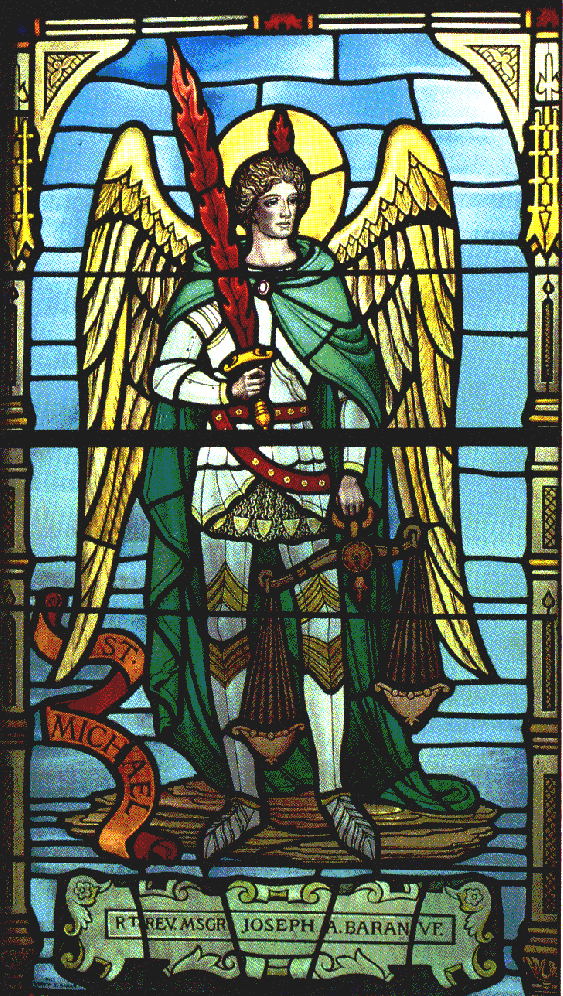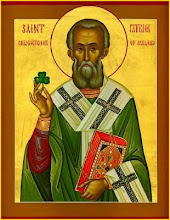from The Continuum
"I was responding to a comment in another post, and realized that this subject justifies a bit more than one blog comment. We will begin with the comment I was writing in response:
Raphael wrote:
[The Douay-Rheims translation] has been in use since its first edition in 1610. It is a near as possible word-for-word translation of the Latin Vulgate, being the work of St. Jerome (342-420). St. Jerome's work is a careful, word-for-word translation of the original texts.
We do owe a lot to St. Jerome, but here we see a need for better scholarship than was possible in his age. 1 The traditional translation of the First commandment provides a splendid example of what I mean.
My own literal translation of the first commandment, directly from the Hebrew with the original syntax, goes like this:
"No having to you other gods over the face."
This translation is absolutely exact, and it makes no sense. Now, the word I have translated literally as "over" means, by implication, "in front of." This can be summed up in one word: "Before;" that is, as long as we understand that "before" means "in the presence of." Now, from the original, we have a problem. Does the commandment mean, "No having to you other gods before your face," or "before my face," in line the accepted standard translation ("before Me")?
The traditional translation is drawn from the larger theological understanding that God's presence fills the whole earth, and indeed, all creation. And so, the translation, "Thou shalt have no other gods before me," requires this added revelation, termed by theology as omnipresence. Also, the distinction between having other gods, and having idols, is a distinction between the first and second commandment that helps us learn the subtle difference between a false god and an idol. This may not have been as clear in the days of Moses as it would be later. The Gnostics did not have literal idols, but rather false gods by definition. The ultimate false god that has no idol, that is, no image before which the devotee bows in worship, is the god of Mohamed.
The traditional rendering of the first commandment, consistent with the Latin translation (The Vulgate) is quite helpful in one respect, and not at all helpful in another. By helping us to see that worship of any other god is a sin even without an idol (as would be lost with our alternative option, “before your face”), we are able to grasp the fuller meaning of scripture. It is just as wrong to worship conceptual gods, as Marcion and Mohamed proclaimed, as it is to worship a deity represented by an idol. Unfortunately, the same customary translation that helps us in this respect also fails us by combining the first and second commandment into one commandment (followed by the equally mistaken custom of dividing the tenth commandment into two separate commandments), weakening the strength of this teaching. This was corrected by the Church of England, both in its very first Book of Common Prayer and in the early translations of the Bible into English
Raphael wrote also:
For this reason [by which he refers to what he said about the Vulgate], the Douay-Rheims is considered the definitive translation.
I prefer the translation of 1611. "Translated out of the original tongues, and with the former translations diligently compared and revised, by his Majesty's special command." The translators were aided by their use of the original Hebrew and Greek texts. On the other hand, their conservatism kept them from making arbitrary and radical changes in traditional meaning. Without the second part, their diligence in comparison to former translations, they may have felt free to use translation as an excuse to be overly creative. That is, not that accurate translation would have been the problem, but the feeling and assumption of poetic license. This presumption of too much authority by some modern translators has led to utterly false renderings. In a previous article, I provided the following example (about the first error in one of the worst versions of the Bible available in English):
“ The first mistranslation in the NRSV (New Revised Standard Version) combines the first two verses of Genesis into one sentence, adding wrongly the word 'when,' as if the world existed before God’s creation. ‘In the beginning when God created the heavens and the earth, the earth was without form…’ The Hebrew simply does not justify this ‘translation’ ... The first two sentences are not joined in the original Hebrew. The older “And, the earth was without form and void...” is literally correct, and it cannot be used to suggest Pantheism.”
The mistranslation I cited has become quite trendy among people who seem bent on trying to destroy the revealed doctrine of creatio ex nihilo, and so the NRSV is not the only example of this particular abuse. The problem here is either one of deliberate mistranslation, or an exaggerated regard for poetic license. Either way, it flies in the face of the two things that steered the translators of The Authorised Version (the King James). It would have been prevented by a sincere principle to “translate out of the original tongues" added by the second principle as a safeguard, namely, “and with the former translations diligently compared and revised.” What marked the King James as setting the standard for Bible translation was that combination of accuracy and humility. Accuracy of language and meaning, aided by the humility to learn from the work of past generations. Furthermore, this requires both an education in languages and in theology.
1.About St. Jerome, here is an interesting passage from a book. “'The flesh I might try to break with frequent fasting: but my mind was seething with imagination: so to tame it, I gave myself up for training to one of the brethren, a Hebrew who had come to the faith. And, so after the subtlety of Quintilian, the flowing of Cicero, the gravity of Fronto and the gentleness of Pliny, I began to learn another alphabet, and meditate on words that hissed and words that gasped' The final vintage was to be the Vulgate translation of the Old Testament: he was still working on Hebrew in his old age.”Helen Waddell, The Desert Fathers, (New York, 1998), p.33"
St. Michael the Archangel

Patron Saint of Police Officers
Tuesday, March 11, 2008
Translations and Theology - Fr. Robert Hart
Posted by
Jerry S
at
3:10 AM
![]()
Subscribe to:
Post Comments (Atom)








No comments:
Post a Comment